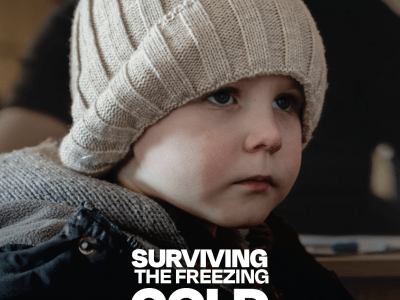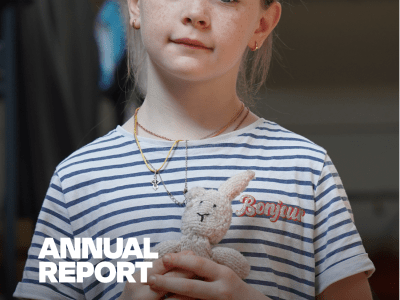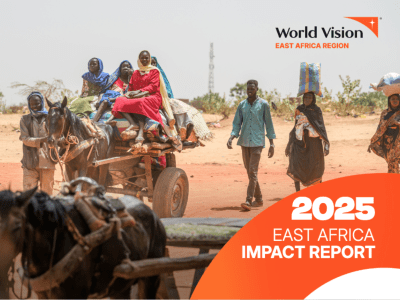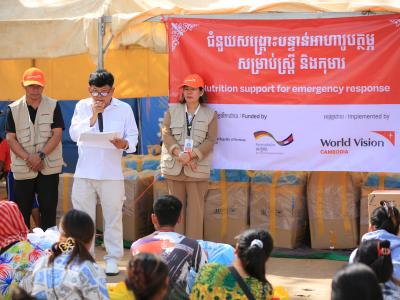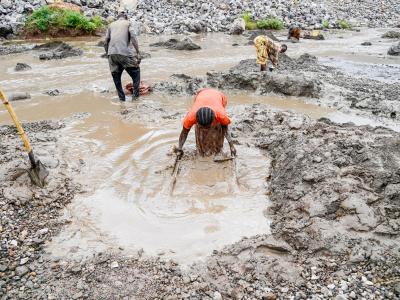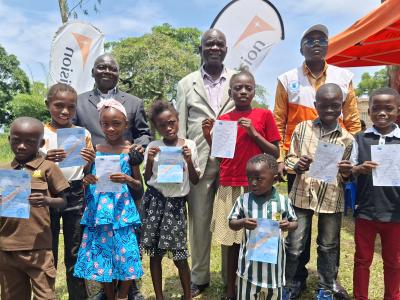press release / February 19, 2026
Four Years On: 1 in 3 Ukrainian Children Now in Need of Humanitarian Assistance
Four years into the war in Ukraine, children remain at the centre of a deepening protection crisis. Today, one in three children in Ukraine requires humanitarian assistance, as sustained exposure to violence, displacement, family separation and the erosion of essential services continue to shape their daily lives.
publication / February 5, 2026
Myanmar Earthquake | Situation Update | Edition 16
World Vision is deeply concerned for the well-being of children and their families affected by the earthquake: Children are among the most affected, facing increased risks, loss of learning, and urgent protection needs. World Vision is providing life-saving relief assistance to the children and the families affected by the earthquake. We aim to support 500,000 people, including 85,057 boys and 86,902 girls, through both immediate relief and long-term recovery efforts.
publication / February 12, 2026
Surviving the Freezing Cold Under Fire: How Winter Disrupts Education and Mental Health Support for Ukrainian Children
As winter hardship intensifies in Ukraine, 100% of surveyed families report extreme conditions where a lack of heat, electricity, and education is pushing children to a breaking point. This briefing outlines the urgent need for flexible funding and support to protect families from a cumulative humanitarian crisis.
publication / February 18, 2026
Annual Report 2025: Standing With Children Through Four Years of War in Ukraine
As the Ukraine Crisis Response enters its fifth year, the war continues to devastate millions of lives, particularly children. Over the past four years, World Vision Ukraine has reached more than 2.3 million people, including over 1 million children, providing critical support in education, mental health, protection, cash assistance, livelihoods, basic needs services and winterisation.
publication / February 23, 2026
World Vision East Africa Impact Report 2025
Despite escalating conflict, climate shocks, economic instability and widespread displacement, we reached over 26 million people, including 16.4 million children
press release / February 23, 2026
PRESS RELEASE: Germany Supports Critical Nutrition and Newborn Care for Displaced Families in Cambodia’s Remaining Safety Centres
The Embassy of the Federal Republic of Germany has partnered with World Vision International in Cambodia to deliver life‑saving nutrition and newborn care support to displaced families still living in safety centres across Oddar Meanchey, Banteay Meanchey, Siem Reap and Preah Vihear. With a contribution of EUR 111,111.11, the project provides essential supplements and therapeutic foods for 2,500 children under five and 1,000 pregnant and lactating women, along with 200 newborn care kits for vulnerable mothers.
The support builds on Germany’s earlier assistance in September 2025 and comes at a time when many families continue to face uncertainty and limited access to food and healthcare. The initiative is implemented in coordination with local authorities and health facilities to ensure effective and accountable delivery.
World Vision Cambodia’s National Director, Janes I. Ginting, highlighted the ongoing hardships faced by displaced families and expressed gratitude to the German Embassy for its continued commitment. For mothers like Sreynoch, a first‑time mother living in a safety centre, the assistance brings both immediate relief and hope as families await a safe return home.
press release / February 3, 2026
World Vision Calls For Urgent Protection of Children Following Deadly Mining Landslide In Eastern DR Congo
In this press release, World Vision expresses deep concern over a deadly landslide at the Rubaya artisanal mining site in Masisi, North Kivu, which has killed more than 200 people, including an estimated 70 children. Triggered by heavy rainfall, the tragedy highlights the extreme risks faced by communities already affected by conflict, displacement, and poverty. The press release underscores how poorly regulated mining and armed group control of mineral-rich areas continue to expose children to dangerous labour, exploitation, and loss of education, and calls for urgent humanitarian assistance alongside long-term action to address the root causes driving children into hazardous work.
article / February 18, 2026
DR Congo: 2,400 Children Now Registered in the Civil Registry Thanks to the Action of World Vision
This article highlights how 2,400 children in Bukanga Lonzo, Kwango Province, have officially received birth certificates thanks to advocacy efforts led by World Vision. Through its Citizen Voice and Action (CVA) approach, the organisation worked alongside local authorities, the civil registry and community partners to regularise the status of children who had never been registered at birth. The piece underscores the importance of legal identity as a gateway to fundamental rights, including access to education, healthcare and public services. It features testimonies from local leaders, judicial authorities and parents, illustrating both the legal significance and the emotional impact of receiving a birth certificate. Beyond celebrating the milestone, the article also raises awareness about the legal requirement to register children within 90 days of birth and calls for continued collaboration to ensure that every child is recognised, protected and given a fair start in life.
press release / February 11, 2026
Urgent Call Launched to Ensure Access to Safe Water, Sanitation, and Hygiene to Save the Lives of Thousands of Children
Press release highlighting Aqua nexus a plan to expand access to clean water for vulnerable families in Latin America and the Caribbean


